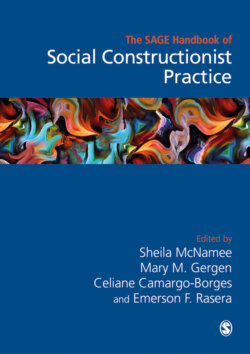Читать книгу The Sage Handbook of Social Constructionist Practice - Группа авторов - Страница 68
На сайте Литреса книга снята с продажи.
A Case of Transforming Self and Community: The Journal of Action Research
ОглавлениеWhen baking an apple pie from scratch, quipped physicist Carl Sagan, you must start with the big bang. In other words, as everything is connected to everything else, the location of a pragmatic starting point is always a choice; Similarly, when recounting a case. Let's take August 29 as a start then. I remember it because I was celebrating my birthday. This was a day punctuated by getting to give a keynote address at an international conference titled, ‘Transformations 2017’, hosted by the University of Dundee, Scotland. This date provides a good starting point from which to look back and see specific notable results which have emerged through the practice of action-oriented research for transformations, namely: i) a new articulation of Action-oriented Research for Transformations (ART); ii), refreshed emphasis by the Action Research journal to develop and publish papers that exemplify ART; iii) stewarding a new global community (Action Research Plus) which gathers online and in person to provide content, curriculum and gatherings for those interested in this ARTful practice of knowledge creation. What follows is therefore a case that integrates personal, interpersonal and impersonal findings. It is not presented, as is conventional scholarship, as a case of work being done ‘somewhere by someones’, though its methodologies and principles are similar to the many such disembodied cases. Instead it is a case offered by the author in the first person.
The ‘Transformations 2017’ conference was itself a pearl in a strand among events and efforts championed by scholars concerned by climate change. Professor Karen O'Brien, a geographer, was figural in such events. Karen was a co-recipient of the Nobel Prize for work with the International Panel on Climate Change. Since then, she has come to feel stymied by the reluctance among IPCC team scientists to even mention ‘transformation’ in connection to climate change. The term was deemed too political, too contentious. There is wisdom in this reluctance given that outright science denial often hinges on the claim that science is biased. Additionally, there is the ongoing sensitivity of scholars to the negative colonizing impact of zealous experts. Still, if talk of transformation is said by scholars to be taboo, then talk of pragmatic efforts, much less engagement of scholars with non-elites, becomes impossible to discuss. Imagine if even 20% of IPCC funding could be spent on local experiments in combatting climate change in ways that those involved might learn from and build upon, harvesting the collective power of abundant, small-scale, nature-based efforts. To get close to such an outcome requires acknowledgment of the need for transformation and a scholarly practice that can support that. It was in this context that I was invited to talk about action research as an orientation to transformative knowledge creation.
Despite the often-unquestioned norms of the scientific approach and the heretofore marginalization of action researching as a challenge to the dominant regime, interest in action research has been climbing exponentially since the 1970s. As such, it is a sibling to many efforts today that call for a transformation of the very practice of science, many of which may be found in the chapters of this Handbook. Action researchers can understand the sensitivities around the term transformation without shying away from it. We can seek to be nuanced. Also because of the centrality of stakeholders in decision making, we can strengthen ethical guardrails and have our inclusionary efforts be more evident.
A key part of the relational work of action research is to locate allies in other fields and see what we might co-create together. I therefore approached the Transformations conference as an opportunity to meet thinking partners in the field of climate change. As the editor in chief of a journal, I was also in a position to convene a guest editor team for a special issue that allowed us to blend ideas of action research with those of new allies who do not identify with the legacy or label of action research. With like-spirited guest editors Karen O'Brien, Steve Waddell, Marina Apgar, Ben Teehankee and Ioan Fazey, our collaboration eventuated in an editorial essay which became an important articulation of ART (Bradbury et al., 2019). We also succeeded in bringing a special issue on Climate Transformations to fruition, which is available without a paywall (https://actionresearchplus.com/climate-transformations/) alongside a set of papers, each emphasizing engaging aspects of a new generation of ART.
